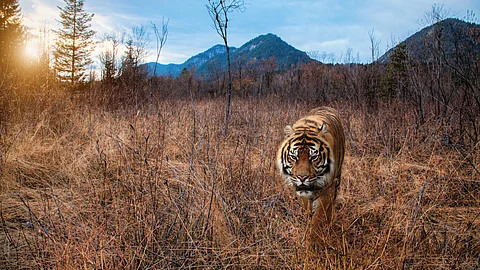
- Destinations
- Experiences
- Stay
- What's new
- Editor’s Picks
- Responsible Tourism
- CampaignsCampaigns
- Subscribe

The famous reserves of Jim Corbett, Bandhavgarh, and Ranthambore are the first things that most people consider when they think of India's wildlife. However, there are lesser-known sanctuaries alive with animals, unique environments, and rare opportunities for the daring traveler that are tucked away in the more peaceful parts of the nation. These comparatively unknown shelters, which range from desert reserves to lush mangroves, not only preserve India's biodiversity but also give tourists a chance to see nature's more untamed side away from the throng. Here is a list of lesser-known wildlife sanctuaries and tiger reserves in India that should be on your travel itinerary.
Pakke Tiger Reserve, an enchanted sanctuary tucked away in the Eastern Himalayas, is well-known for its amazing hornbill population, uncommon biodiversity, and deep woods. It is one of the rare locations that borders Assam and is home to four distinct kinds of hornbills in addition to elusive animals like Himalayan black bears, clouded leopards, and, of course, the royal Bengal tiger. With more than 300 bird species identified, Pakke is also a birdwatcher's paradise.
Pakke's community-based conservation concept is what sets it apart. It is encouraging to see people and wildlife living in harmony because local tribes, especially the Nyishi, have been instrumental in preserving the hornbill population.
Tip: Book a guided tour with a local conservation group to learn about the tribal involvement in conservation.
Satkosia Tiger Reserve, a hidden treasure in Odisha, is situated where the Deccan Plateau and Eastern Ghats converge. This reserve covers an area of almost 980 square kilometres, and the Mahanadi River cuts through the centre of it, forming a breathtaking gorge. Tigers, leopards, elephants, and mugger crocodiles can all be found in the varied scenery. But its real allure is found in the verdant valleys and thick forests that provide breathtaking views.
Satkosia is a tranquil getaway into nature because it is still largely untouched by tourists. Boat rides are perfect because of the scenic surroundings and the riverine habitat, where you may see crocodiles lounging along the banks.
Tip: Try a boat safari on the Mahanadi River for unique wildlife sightings and scenic views.
One of Karnataka's best-kept treasures is Bhadra Wildlife Sanctuary, situated in the Western Ghats. The reserve offers a combination of breathtaking scenery and abundant species. Tigers, leopards, elephants, and Indian gaurs all coexist peacefully. Bhadra, renowned for its peaceful rivers, mist-covered hills, and thick forests, is a haven where nature is supreme.
The adventure that Bhadra gives is what sets it apart. While climbers can explore neighboring peaks like Kemmangundi and Bababudangiri, the Bhadra River provides opportunity for river rafting. The Wodeyar royalty of Mysore used to hunt in the forests, which adds to Bhadra's intriguing past.
Tip: Consider staying in one of the eco-friendly lodges nearby to experience the sanctuary’s conservation-first approach.
Even though Telangana isn't typically considered a wildlife destination, you could be convinced after visiting Kawal Tiger Reserve. This sanctuary, one of India's more recent tiger reserves, is located in the state's northern region. The tropical dry deciduous woods that make up the majority of Kawal's 2,015 square kilometers make it the perfect home for animals like tigers, leopards, sloth bears, and sambar deer.
For those looking for a more uncrowded, rustic wildlife encounter, Kawal is perfect. The infrastructure of the reserve is being improved by the forest department, but it is still one of India's best-kept secrets. In the middle of its untamed surroundings, this sanctuary provides visitors with a genuine wilderness experience.
Tip: Plan your visit through the Telangana Forest Department to ensure safe and organized access to the reserve.
Nameri National Park, which is situated in the foothills of Assam, provides a remarkable combination of nature and adventure. Visitors can enjoy activities like rafting along the Jia Bhoroli River and birdwatching in this unique combination of a national park and tiger reserve. In contrast to other tiger reserves, Nameri allows guests to explore on foot with the assistance of forest guides.
The park's appeal is found in its variety of birds and tranquil riverbank settings, although tigers are hard to observe here because of the thick vegetation. The park is a popular spot for angling enthusiasts because it serves as a breeding ground for a number of fish species.
Tip: For a different experience, try fishing (catch and release) or rafting with one of the eco-camps near the park.
